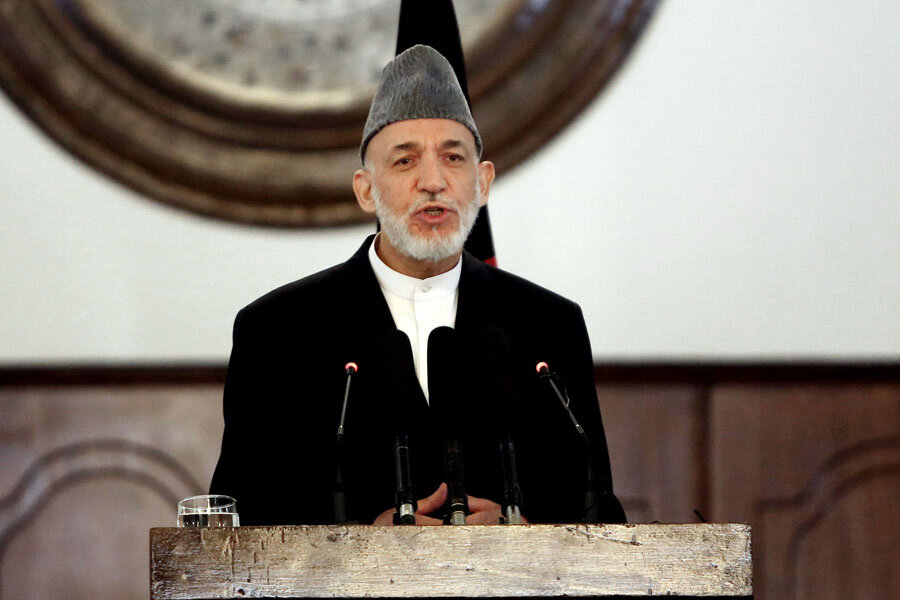Afghanistan's Karzai blasts US on way out of office
Loading...
| Kabul, Afghanistan
Outgoing Afghan President Hamid Karzai used his farewell speech on Tuesday to take one last swipe at the United States, capping a long-testy relationship with the accusation that America hasn't wanted peace in Afghanistan. The US ambassador called the comments ungracious and ungrateful.
The only president Afghanistan has known since the 2001 US-led invasion said the United States wanted war in Afghanistan "because of its own interests." Karzai's relationship with the US has grown increasingly fragile in recent years, but the US-Afghan relationship may get a reset on Monday, when President-elect Ashraf Ghani Ahmadzai will be sworn in.
The United States has spent more than $100 billion on aid in Afghanistan since 2001 to train and equip the country's security forces, to pave crumbling dirt roads, to upgrade hospitals and to build schools. But Karzai in his speech thanked a slew of countries for their help — India, Japan, China, Iran, Turkey, Saudi Arabia, South Korea and Germany — without thanking the US.
The speech fingered the US and the military leaders of neighboring Pakistan as the powers backing perpetual war.
"If America and Pakistan really want it, peace will come to Afghanistan," Karzai said. "The war in Afghanistan is to the benefit of foreigners. But Afghans on both sides are the sacrificial lambs and victims of this war."
More than 2,200 US forces have died in Afghanistan operations since 2001. Nearly 20,000 have been wounded.
US Ambassador James B. Cunningham called Karzai's comments ungracious and ungrateful, though he said he believes the wider Afghan public appreciates American assistance and efforts over the last 13 years.
"It makes me kind of sad. I think his remarks which were uncalled for, do a disservice to the American people and dishonor the huge sacrifices Americans have made here and continue to make here," Cunningham told a gathering of journalists.
Cunningham noted that Karai has overseen the country's first peaceful transfer of power, part of a positive legacy overall. The president, he said, "undoubtedly had one of the more difficult jobs in the world for a long time."
The United Nations says that some 8,000 Afghan civilians have been killed in the conflict over the last five years alone. Karzai for years has railed against US military strikes for the civilian casualties that some of them cause — although the United Nations has said insurgents are to blame for the overwhelming majority of casualties.
In his final year in office Karzai refused to sign a security agreement with the US that would set the legal framework to allow about 10,000 American military advisers and trainers to stay in the country next year. Ghani Ahmadzai has said he will sign it.
Samehullah Samem, a member of parliament from the western province of Farah, said as a decade-long ruler Karzai has earned respect among Afghans, but that he should be more careful with his words toward an ally. He noted that the Afghan economy is faltering.
"We are completely dependent on the international community. We need the support of the international community, especially the United States of America," Samem said.
US military and intelligence operatives helped transport Karzai around the region in late 2001, shortly after the attacks in New York and Washington. That US connection helped pave the way to the presidency.
Ghani Ahmadzai's entrance is more conventional. A former finance minister, the new president has worked at the World Bank and earned a PhD from New York's Colombia University. His path to the presidency follows a long election season that ended with negotiations for a national unity government and the election commission giving him 55 percent of the runoff vote.
Cunningham said the US was asked to be involved in the unity negotiations and that the US exerted itself to help Afghanistan succeed, an important achievement especially given the "psychic investment as well as blood and treasure" here since 2001.
The 13-year war against the Taliban has largely been turned over to Afghan security forces, a development that has seen casualties among Afghan soldiers rise significantly this year.







